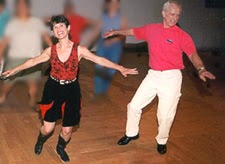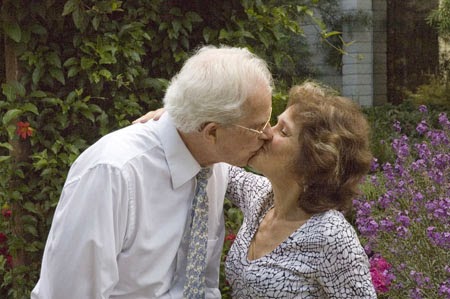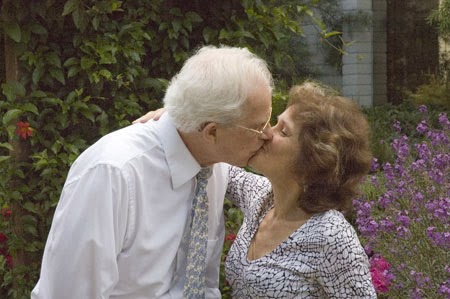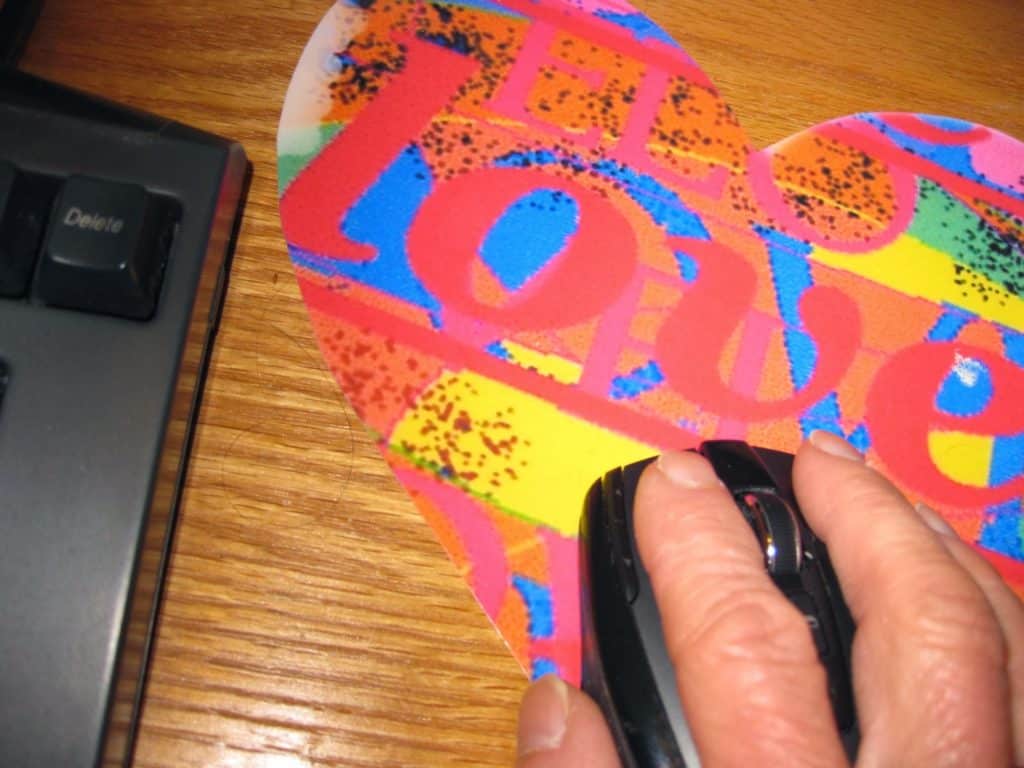Posts Tagged ‘love’
“How we write about love depends on how old we are”
 |
| Brian Rea for The New York Times |
“How we write about love depends on how old we are,” observes Daniel Jones in his Modern Love column in The New York Times, Feb. 5, 2015. He explains:
The young overwhelmingly write with a mixture of anxiety and hope. Their stories ask: What is it going to be for me?
Those in midlife are more often driven to their keyboards by feelings of malaise and disillusionment. Their stories ask: Is this really what it is for me?
And older people almost always write from a place of appreciation, regardless of how difficult things may be. Their message: All things considered, I feel pretty lucky.
This last point hit home with me. As a sex educator, I hear people’s problems all the time. But I also hear the good parts — the humor and joy and sweetness of what happens when we love at our age. Those of us who are lucky enough to have found love at this time of our lives are radiant with joy telling our love stories — even if that joy is tempered with the sadness of loss.
I know I feel that way. On this Valentine’s Day, I’m remembering how my dear Robert made Feb. 14 a true celebration of love for seven years with gifts, cards, whispered endearments, languid lovemaking, and lots of laughter.
As sad as I am that I will never hold Robert again on Valentine’s Day or any other day, that feeling has nowhere near the power of the joy I feel that this love was in my life. It feels like a miracle that we ever found each at all, let alone so late in life.
 |
| Joan and Robert 2001 |
What if he had never wandered into my line dance class that eventful night? We might never have met, never have crossed paths.
What if I hadn’t been assertive (aggressive?) about making the first moves? He was content to see me as his dance teacher (which in itself is bizarre, since he had formal training as a dancer since the age of two, and I had no formal training at all), and he thought that was an uncrossable boundary.
What if I hadn’t dared to proposition him? (You didn’t know that part of our story? Read it in Better Than I Ever Expected: Straight Talk about Sex After Sixty!)
What if we had never realized one of the most important themes of our love story: that the ways we were the most different were the ways we most wanted to grow.
You see, at first, we saw our personality clashes and independence as proof that we were too different to ever come together as a couple — it would be too much work, too many compromises, and besides, we were satisfied with the way we were, thank you very much.
 |
| Robert and Joan 2006 |
But over the few years we had together, this attitude changed. The closer we got, the more we came to respect our differences — even laugh about them — and the less we felt we needed to resist change. In fact, we discovered that compromise led to change in directions we each wanted to grow.
Once we saw our differences as an opportunity to grow in ways that would be as good for us individually as they were good for us as a couple, we stopped resisting, reframed what we were willing to do for each other, and we blossomed together and apart.
What did you learn about love and about yourself in later life? I hope you’ll share your experiences.
Valentine’s Day Reflection
For many of us who have had many decades of relationships, Valentine’s Day is a time to reflect.
Personally, I am glad for every relationship in my life, whether or not it turned out to be right for me. Each one helped me refine who I was, what I had to give a partner, what I was looking for, and what sustained me and stimulated me vs. what boxed me in or hurt me.
I’ve remained close friends with past lovers and my first husband, and I treasure them in my life now. These are men whom I’ve loved and love still, and I know they feel that way about me, too.
Other past lovers I’ve lost touch with, but would love to bring back for a conversation about the past and the present.
 Of course Valentine’s Day is also about missing Robert, as it is for you if you’ve lost your love. But instead of today being all about loss, let’s let it be about what we’ve found over our long life of loving.
Of course Valentine’s Day is also about missing Robert, as it is for you if you’ve lost your love. But instead of today being all about loss, let’s let it be about what we’ve found over our long life of loving.
I’d love to involve you in a discussion of how we see past and present relationships, what we’ve learned from them, what we see — or hope to see — in our future. Please comment and get the conversation going.
If you don’t want to use your name, please identify yourself with a first name of your choice — let’s not have a string of comments from “Anonymous,” okay? Please include your age.
(Do I really need to say that “please comment” is NOT an invitation to be spammed by purveyors of pills, porn, jelly toys, escorts, or other products and services? I moderate comments, and my community trusts me to keep the spammers out of the conversation. If, on the other hand, you’re an author, educator, or blogger in a relevant field, I’m happy to have you include a link with your comment.)
Danny and Annie, “a beautiful song from a busted old radio”
“Listen, if we’re going anywhere, we’re going down the aisle, because I’m too tired, too sick, and too sore to do any other damn thing,” Danny told Annie 27 years ago.
I love this story from StoryCorps. Danny and Annie are narrating their love story, and they sound just as romantic now as in the first bloom of their relationship. “It’s like hearing a beautiful song from a busted old radio,” Danny tells Annie about why he tells her he loves her every day. “Thanks for keeping the old radio around.”
Listen to the whole 5:50 minutes — but be prepared to cry half way through when you hear about Danny’s illness, and at the end, when you read the final note on the video. I did.
As I’ve learned personally, when we love each other at our age, part of that loving is facing and accepting that one of us will lose the other. That’s a strong reason for embracing each other as closely and lovingly as we can, while we can.
Thank you, AARP Blog for posting this video, and to StoryCorps for recording it. I’ve listened to it three times in a row now — let me know how you react to it.
Changes after Prostate Surgery: Tina Tessina
Many of you have been reading and asking about prostate cancer, how it affects sexuality, how spouses/lovers can communicate and keep their love strong while living with it. Some of the most widely read posts on this blog have been those dealing with prostate cancer, such as “A man asks about sex after prostate cancer” and “Grace Period: a novel about living with prostate cancer.”
In response to your interest, I’ve asked Tina Tessina, Ph.D. to comment on this subject. Besides being a psychotherapist and author, Tina writes from experience: her husband is living with prostate cancer. Here are her comments:
The changes that come after prostate surgery are, like all changes, not easy. We don’t like to have to deal with changes, especially those that confront us with our mortality. But, I can happily report, with some encouragement and enthusiasm from me, my wonderful husband is quite functional sexually. His surgery was in 2002, he just got another ‘undetectable’ PSA test, so we are blessed.
For us, the blessing is in how heightened our love and appreciation (which was pretty good before) has been by the threat of terminal illness. Richard is lucky — they got it early, it has not spread, the surgery went well. His second surgery to have an artificial sphincter put on his urethra, also went well.
Others, I know, have a more difficult time. But, as Gerald Haslam wrote in Grace Period, “Live for the moment, since that may be all you have.” Richard and I decided to do that in 2002, and we’ve been making the most of our moments ever since. Every day is a gift, another cup of sweetness, and we drain it to the last drop. One of our joke lines is “I’d like another one of them there drinks,” from Scrooge, referring to the Cup of Human Kindness given to him by the Ghost of Christmas Present.
For some couples, the tension of serious illness creates crabbiness and bickering. Richard and I have never wanted to waste time arguing, and we haven’t for a long time. I don’t believe it helps anything that’s going on. In my newest book, Money, Sex and Kids: Stop Squabbling About the Three Things That Can Destroy Your Marriage out from Adams Media spring 2007, I help couples who are fighting learn new methods of getting along so they can enjoy their time together.
For more, see Tina Tessina’s Dr. Romance Blog. Dr. Tessina is a psychotherapist, author of several books including It Ends With You: Grow Up and Out of Dysfunction, How To Be a Couple and Still Be Free, and The Unofficial Guide to Dating Again. She writes the “Dating Dr.” column on www.CouplesCompany.com and “Dr. Romance” on Yahoo! Personals.

